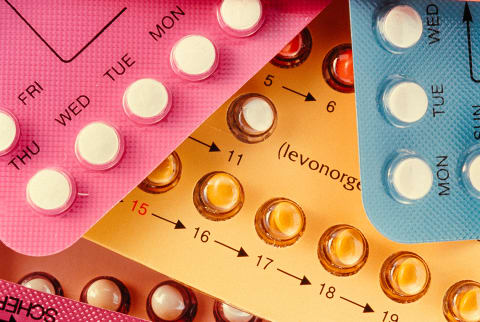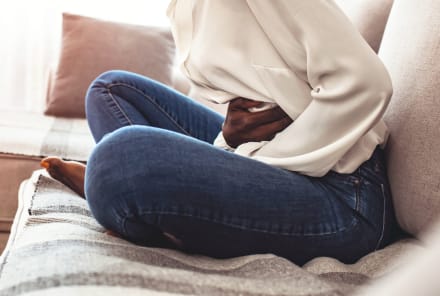Advertisement
Is It Bad To Skip Your Period On Birth Control? OB/GYNs Weigh In


According to the CDC, 14% of women aged 15-49 take hormonal birth control pills1. However widespread, the pill is not risk-free. The pill's side effects include a slightly increased risk of blood clots, changes in mood, headaches, and breakthrough bleeding. To minimize these risks, it's important to understand how to use the pill safely.
In some cases, oral hormonal birth control allows you to "miss" your period. Simply skip over your week of sugar pills and voilà, you won't have to worry about bleeding.
However, this raises the question—is it unhealthy to skip your period in this way? And should you do it consistently? I asked the experts to unpack the science behind the pill and how to use it to honor the body's unique rhythms.
How ovulation and menstruation work on and off birth control
Before we dive into the answer here, let's recap what exactly happens during the cycle to cause a period in the first place.
"Your ovaries secrete estrogen in the first part of the cycle that are akin to bricks building the lining of the uterus preparing for the intended pregnancy," explains board-certified OB/GYN Karen Toubi, M.D.
After this phase ends, you'll go into ovulation (if you aren't on the pill, that is). This is where the corpus luteum (ovulatory follicle) secretes progesterone that behaves like cement in between the bricks of estrogen, stabilizing the lining, Toubi adds.
"If no fertilization occurs, the ovulatory cyst and progesterone disappear, and a period results from the abrupt drop in progesterone. This sheds the lining that had previously been formed by the estrogen in the first part of the cycle," Toubi says.
When you're on birth control, however, you're giving your body hormones like estrogen and progesterone in a uniform, daily fashion. Without the severe drop in progesterone, the uterine lining doesn't have a chance to thicken significantly as it would during a normal ovulatory cycle without the pill.
At the end of the traditional pack of birth control pills, you'll take a weeklong break from the hormones, which mimics a normal ovulatory cycle (a drop in progesterone), which then causes the potential to bleed.
This isn't a true "period" but rather bleeding caused from the withdrawal in hormones, which is why it may also be called a "withdrawal bleed." A typical period includes the uterine lining, so it's quite different from a withdrawal bleed on birth control.
Is it bad to skip your period on hormonal birth control?
If you skip those sugar pills, you will continue giving your body the hormones that keep the uterine lining thin and avoid the progesterone drop. In other words, no period is being "held up" in the body.
But the question still remains: Is it unhealthy to skip your period on birth control? Not exactly, but that doesn't mean never having your period is the best strategy for optimal health, either.
"There are no risks to skipping your period on birth control, outside of the risks that already occur with birth control itself," says board-certified OB/GYN Arianna Sholes-Douglas, M.D., FACOG.
Some people think that by suppressing their period for a few months, a heavier bleed will occur when they return to the placebo pill, but that's not always the case.
"This is not necessarily the case because you are essentially keeping your hormones in a steady state," Douglas says. However, everyone is different, and hormonal changes may cause some people to bleed more than others.
By skipping your period, you're not doing your body any harm, but you're not learning from this important health metric either. Because as annoying as it may be, your monthly period can be an early indicator of potential health concerns.
"Menstrual cycles are a vital sign of our overall health. This is something that Western medicine, biomedicine, Chinese medicine, Ayurvedic medicine can all agree on: Periods are a monthly report card about what's going on in our bodies," menstrual wellness expert, psychologist, and herbalist Lulu Ge, once said on an episode of mindbodygreen's Clean Beauty School podcast.
Those who want to get a natural period will need to look into other forms of birth control, such as cycle tracking or other contraceptive methods.
Summary
Who might want to skip periods?
Board-certified OB/GYN Mary Jane Minkin, M.D., notes that skipping your period while on birth control may be beneficial for some unique cases.
For example, someone with endometriosis who experiences severely painful periods may choose to skip those sugar pills to help improve their quality of life. Plus, being on hormonal birth control pills can help slow the growth of endometrial tissue, in turn helping to minimize symptoms2.
The same goes for those with polycystic ovary syndrome (PCOS) due to the reduction of hyperandrogenism symptoms and endometrial cancer risk3 (which is higher for those with PCOS) while on the pill.
Still, anyone with PCOS or endometriosis should chat with their health care provider before electing to use birth control, especially in a way that's different from intended or prescribed.
Summary
What about hormonal IUDs?
People with hormonal IUDs may skip their periods too, even though it's not voluntary.
IUDs work very differently than hormonal birth control pills. "While using the progesterone IUD, most women continue to ovulate," Toubi explains. But while this happens, the progesterone in the IUD prevents or limits bleeding.
The progesterone located inside the IUD sits in the uterine lining, continuing to stabilize that lining, she says. Over time, the lining will thin out while the IUD prevents the abrupt drop in progesterone, which would otherwise result in a period.
However, different IUDs have different levels of progesterone, so some people may experience a period while others may skip it entirely—and that's OK. But if you have continuous bleeding for more than a week or your cycle changes significantly while using an IUD, consult your doctor.
What about missing your period in general?
All of this aside, what about missing your period when you aren't on birth control of any kind?
A missed period can happen for a number of reasons, says Minkin, including peaks of stress, exercise, travel, and so on. These factors can also delay your period, causing you to bleed at a different time than you're used to.
So, if you skip one period and know that your routine is in flux, there is no need to panic. However, two missed periods in a row would be a yellow flag. At that point, you'll want to consult your health care provider to ensure your body is ovulating regularly. Otherwise, it could be a sign that you're pregnant or something in your reproductive system needs extra attention.
Summary
The takeaway
As of right now, research and health care professionals agree that skipping your period on oral hormonal birth control and hormone-eluding IUDs is not harmful to your health and may be helpful for some people with painful periods. However, there's something to be said for the regularity of a period, so do what's right for your body. If you want to learn more about the ins and outs of your menstrual cycle, check out this day-by-day guide.
Watch Next
Enjoy some of our favorite clips from classes
Enjoy some of our favorite clips from classes
What Is Meditation?
Mindfulness/Spirituality | Light Watkins
Box Breathing
Mindfulness/Spirituality | Gwen Dittmar
What Breathwork Can Address
Mindfulness/Spirituality | Gwen Dittmar
The 8 Limbs of Yoga - What is Asana?
Yoga | Caley Alyssa
Two Standing Postures to Open Up Tight Hips
Yoga | Caley Alyssa
How Plants Can Optimize Athletic Performance
Nutrition | Rich Roll
What to Eat Before a Workout
Nutrition | Rich Roll
How Ayurveda Helps Us Navigate Modern Life
Nutrition | Sahara Rose
Messages About Love & Relationships
Love & Relationships | Esther Perel
Love Languages
Love & Relationships | Esther Perel
What Is Meditation?
Box Breathing
What Breathwork Can Address
The 8 Limbs of Yoga - What is Asana?
Two Standing Postures to Open Up Tight Hips
How Plants Can Optimize Athletic Performance
What to Eat Before a Workout
How Ayurveda Helps Us Navigate Modern Life
Messages About Love & Relationships
Love Languages
Advertisement

Yes, There's A Longevity Vitamin (& People Over 40 Need To Prioritize It)
Molly Knudsen, M.S., RDN

Study Investigates How Fasting Impacts Sleep, Hormone Health & More
Gretchen Lidicker, M.S.

Yes, There's A Longevity Vitamin (& People Over 40 Need To Prioritize It)
Molly Knudsen, M.S., RDN

Study Investigates How Fasting Impacts Sleep, Hormone Health & More
Gretchen Lidicker, M.S.

Yes, There's A Longevity Vitamin (& People Over 40 Need To Prioritize It)
Molly Knudsen, M.S., RDN

Study Investigates How Fasting Impacts Sleep, Hormone Health & More
Gretchen Lidicker, M.S.

Yes, There's A Longevity Vitamin (& People Over 40 Need To Prioritize It)
Molly Knudsen, M.S., RDN

Study Investigates How Fasting Impacts Sleep, Hormone Health & More
Gretchen Lidicker, M.S.














